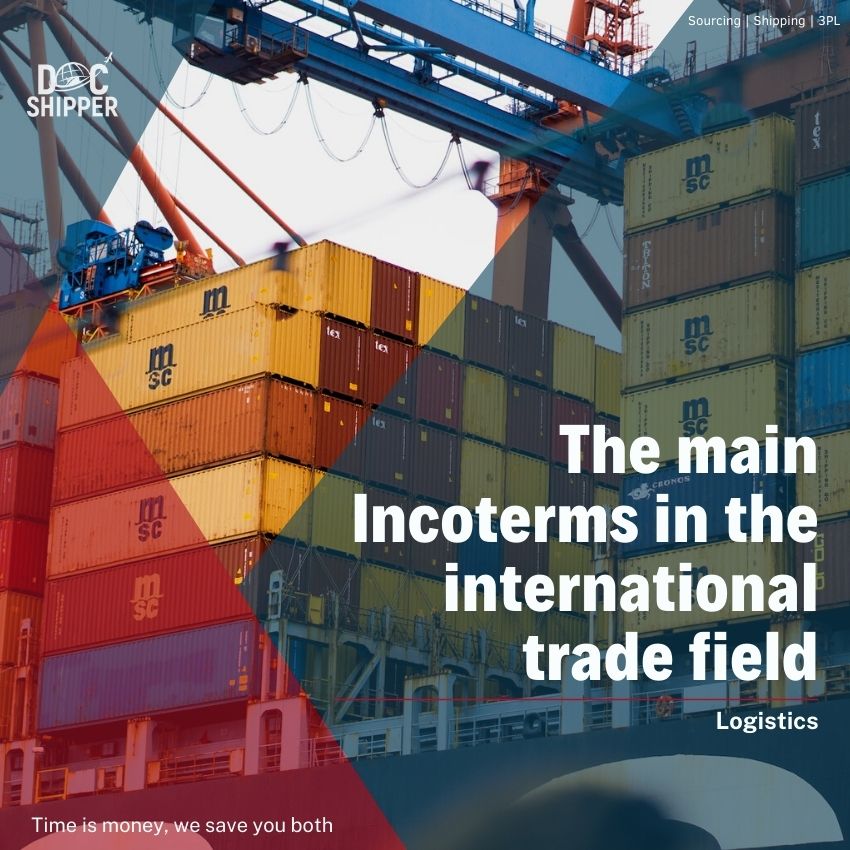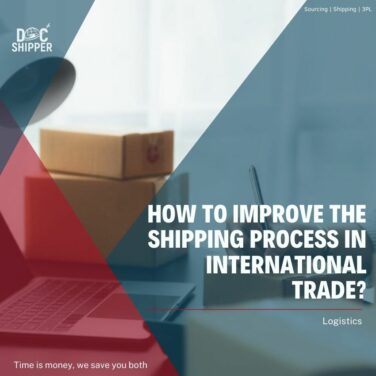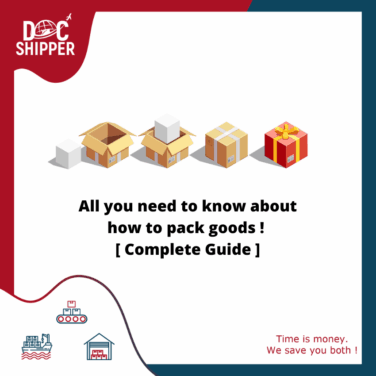The main Incoterms in the international trade field
In international sale contracts, the International Chamber of Commerce (« ICC ») has produced a set of commercial/trade regulations known as the Incoterms.
The Incoterms are optional; the parties to a contract must expressly integrate them in order for them to have legal force. And that’s one of the tasks that DocShipper carries out; using our specialist expertise, we make these operations easier for our clients.
Following a description of Incoterms’ categorization, we’ll go over some of the fundamental characteristics of both Incoterms used for all modes of transportation and those used solely for sea and inland canal transportation. We’ll also go through the Incoterms 2020 regulatory adjustments.
In international sale contracts, the International Chamber of Commerce (« ICC ») has produced a set of commercial/trade regulations known as the Incoterms.
The Incoterms are optional; the parties to a contract must expressly integrate them in order for them to have legal force. And that’s one of the tasks that DocShipper carries out; using our specialist expertise, we make these operations easier for our clients.
Incoterms classification
The four major types of Incoterms are E, F, C, and D.
- EXW is the single trade word in Category E (Departure), which contains no other terms (Ex Works).
- Three phrases from the trade are included in Category F (Main Carriage Unpaid): FCA (Free Carrier), FAS (Free Alongside Ship), FOB (Free on Board)
- Four commercial phrases are contained in the acronyn Category C (Main Carriage Paid):CFR (Carriage and Insurance Reimbursement Fund) CPT (Carriage paid to) CIP (Cost and Freight), Arrival CIF (Cost, Insurance and Freight)
- Category D, which includes the following three commercial terms: DAP (Delivered at Place) (Delivered at Place),DPU (Delivered at Place Unloaded), DDP (Delivered Duty Paid)
The four aforementioned groups can also be divided according to the mode of transportation:
- Incoterms for any mode of transport: EXW, FCA, CPT, CIP, DPU, DAP and DDP;
- Incoterms only for sea and inland waterway transport: FAS, FOB, CFR and CIF.
Each Incoterm contains a set of rules of interpretation for the obligations of both the seller (A1-A10) and the buyer (B1-B10) covering the following issues:
- A1/B1 – General Obligations,
- A2/B2 – Delivery,
- A3/B3 – Transfer of risks,
- A4/B4 – Carriage,
- A5/B5 – Insurance,
- A6/B6 – Delivery/transport document,
- A7/B7 – Export/import clearance,
- A8/B8 – Checking/packaging/marking,
- A9/B9 – Allocation of costs, and
- A10/B10 – Notices.
DocShipper Advice
DocShipper Advice :
Your organization will benefit from knowing the differences between the incoterms, which will help you grow. DocShipper, however, can help you choose which option is preferable for your cargo and organize the freight from A to Z. Contact us to know more.
Your organization will benefit from knowing the differences between the incoterms, which will help you grow. DocShipper, however, can help you choose which option is preferable for your cargo and organize the freight from A to Z. Contact us to know more.
Basic Characteristics of Incoterms for All Forms of Transportation
Incoterm : EXW (Ex Works)
The EXW Incoterm imposes only minimum obligations on the seller. More particularly, the seller is simply required to deliver the goods to the buyer at a named place of delivery which is usually the seller’s place of business, but can be any particular location such as a warehouse, factory, etc., and within the agreed time specified in the contract.
It is not required for the seller to load the goods on any specific vehicle or to clear the goods for export. If the place of delivery is not specified in the contract, or if several places of delivery can be envisaged, “the seller may select the point that best suits its purpose.”
In general, the seller assumes all risks of loss or damage to the products up until the point at which they have not been delivered in accordance with the sale contract. Once delivered, the customer is automatically responsible for this risk. The same is true of any expenditures associated with the goods: before the delivery, the seller is responsible for paying those costs; following delivery, the buyer is.
It is noted by several writers that the EXW Incoterm is “often used in courier shipments when the courier picks up the package from client’s premises and loads the courier’s own vehicle” and that it is better suited for domestic (and not international) trade. Cash in advance and open account are typically the terms of payment for EXW transactions.
As stated in the ICC Guide to Incoterms 2010, parties occasionally add the phrase “loaded” after the mention of the EXW Incoterm, i.e., EXW loaded. Typically, such an amendment is meant to extend accountability to loading activities. Without more information, it is challenging to determine whether a word like this implies “laden at seller’s risk” or “loaded at buyer’s risk.”
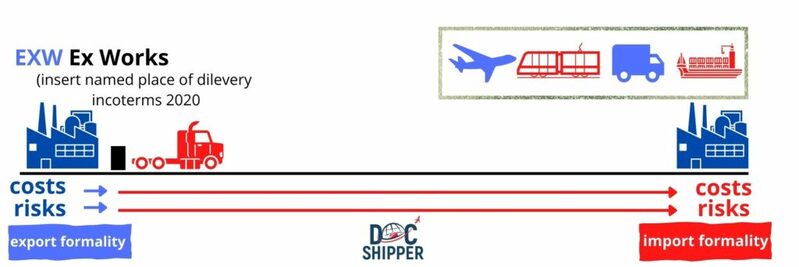
Incoterm: FCA (free carrier)
The following is how the delivery of products happens under the FCA Incoterm:
- The items are regarded delivered when they are put into the transportation vehicle arranged by the buyer when the designated site of delivery is the seller’s premises;
- When the predefined location for delivery is somewhere else, such as a warehouse or factory,
the following conditions must be satisfied in order for the goods to be considered delivered: they must have been loaded onto the seller’s transportation vehicle before it leaves the designated location, be prepared for unloading, and be put at the buyer’s designated carrier’s disposal.
When it comes to the carrier, it is often a business that actually transports products or people for hire, as opposed to just arranging for such transport. Examples include a railway, shipping line, or transportation company for an aircraft. However, under the FCA definition, the carrier may be any anybody who, through a contract, “undertakes to perform or purchase” such services.
A number of additional responsibilities were included in the FCA Incoterm in 2020. The parties may, for instance, agree that the purchase should provide the carrier instructions to give the seller the transport document (bill of landing) with the on-board note. In exchange, the seller agrees to transmit this paperwork to the buyer, who will require it in order to get the carrier to release the items.
Additionally, if appropriate, the FCA Incoterm mandates that the seller clear the products for export. The vendor is not required to clear the products for import, nevertheless. There is no requirement for either the buyer or the seller to have insurance.
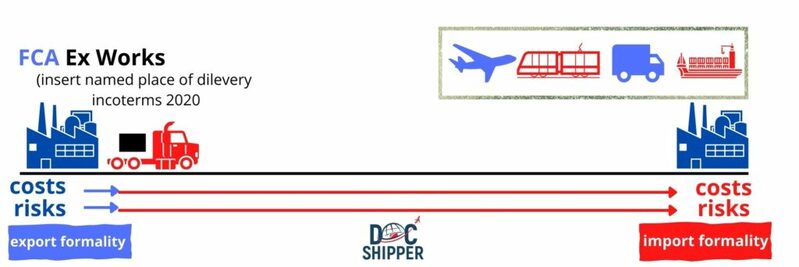
DocShipper Alert
DocShipper Alert: Be careful to get insurance under the FCA incoterm since it won’t be advantageous for either the seller or the buyer. You can learn more about it from DocShipper professionals that will be happy to answer all your questions. Contact us now.
Incoterm: CPT (Carriage Paid to)
According to the CPT Incoterm, the items are considered to have been delivered when they are given by the seller to the carrier at the designated location or are arranged for by the seller to be so given. In this regard, the seller is required to arrange for the transportation of the products from the point of delivery to the location of destination at its own expense.
The transfer of risk from the seller to the buyer takes place at the time of delivery, or when the items are given to the carrier, and is unaffected by the presence of the carriage contract.
However, unless otherwise specified, the seller is responsible for paying all costs associated with unloading the goods at the destination under the terms of the carriage contract.
Additionally, if appropriate, the CPT Incoterm requires that the seller clear the products for export and take full responsibility for any associated risk. However, the seller is under no such import requirement. Both the buyer and the seller are free to decide not to enter into an insurance arrangement.
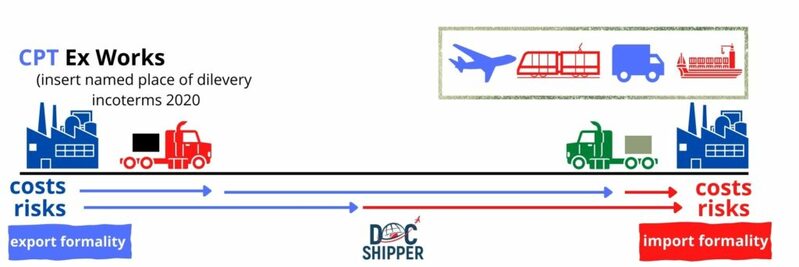
Incoterm: CIP (Carriage and Insurance Paid to)
The seller must carry out the same obligations under the CIP Incoterm as under the CPT Incoterm, i.e., deliver the goods to the carrier the seller has hired and clear them for export, in addition to having to enter into an insurance contract to cover the goods from the place of delivery to, at the very least, the place of destination from the buyer’s risk of loss or damage.
When it comes to insurance, it must be issued in accordance with Terms (A) of the Institute Cargo Clauses or comparable clauses and must at a minimum cover the contractual price + 10%. It was only necessary to have a minimal insurance policy in accordance with Institute Cargo Clauses (C) prior to the 2020 modification of the Incoterms. Even now, the parties may agree on a reduced level of coverage. The seller is required to give the buyer the insurance policy or certificate after a contract has been made.
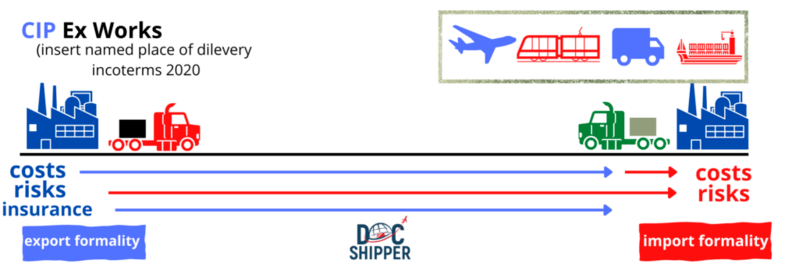
Incoterm: DAP (Delivered at Place)
The DPU Incoterm states that the products are delivered by the seller to the buyer when they are taken out of the transportation vehicle and placed at the buyer’s disposal at the place of destination or, if applicable, at the agreed-upon location there. The seller must unload the products at the destination; it is the only Incoterm that does this. Once more, the DPU Incoterm designates the same location for both delivery and destination. As a result, up until the items are unloaded at their final destination, the seller is responsible for all risks.
Additionally, the seller agrees to reach an agreement for carriage or make arrangements for it at its own expense. It must also approve the products for export. However, imports are not subject to this requirement. At the seller’s expense, the buyer must help the seller get the necessary paperwork for export clearance requirements.
The seller (or the buyer) is under no obligation to get insurance under the DPU Incoterm, in contrast to the CIP Incoterm.
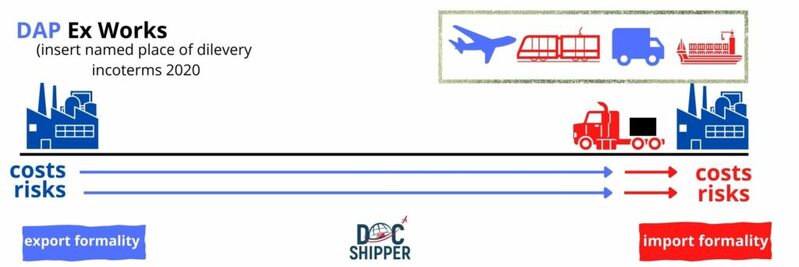
Incoterm: DPU (Delivered at Place Unloaded)
The DPU Incoterm states that the products are delivered by the seller to the buyer when they are taken out of the transportation vehicle and placed at the buyer’s disposal at the place of destination or, if applicable, at the agreed-upon location there. The seller must unload the products at the destination; it is the only Incoterm that does this. Once more, the DPU Incoterm designates the same location for both delivery and destination. As a result, up until the items are unloaded at their final destination, the seller is responsible for all risks.
Additionally, the seller agrees to reach an agreement for carriage or make arrangements for it at its own expense. It must also approve the products for export. However, imports are not subject to this requirement. At the seller’s expense, the buyer must help the seller get the necessary paperwork for export clearance requirements.
The seller (or the buyer) is under no obligation to get insurance under the DPU Incoterm, in contrast to the CIP Incoterm.
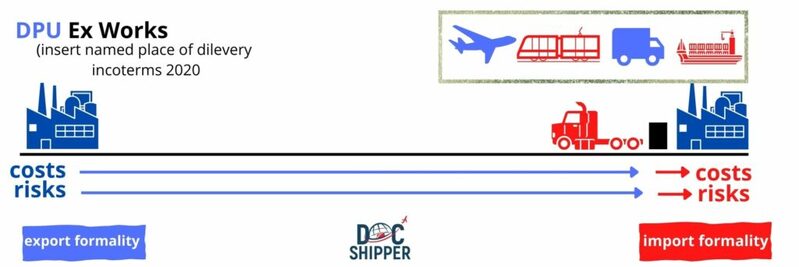
Incoterm : DDP (Delivered duty paid)
According to the DDP Incoterm, the seller is deemed to have delivered the goods to the buyer if they are placed at their disposal, cleared for import, aboard the incoming transportation vehicle, and prepared for unloading at the place of destination or a designated location therein, as applicable. Due to the fact that the DDP Incoterm is the only one needing seller import approval, it places the greatest amount of obligation on the seller.
The DDP Incoterm mandates that the seller enter into the carriage contract or make alternative arrangements for the carriage at its expense, just like with the other Incoterms. However, neither the vendor nor the buyer are required to sign an insurance contract.
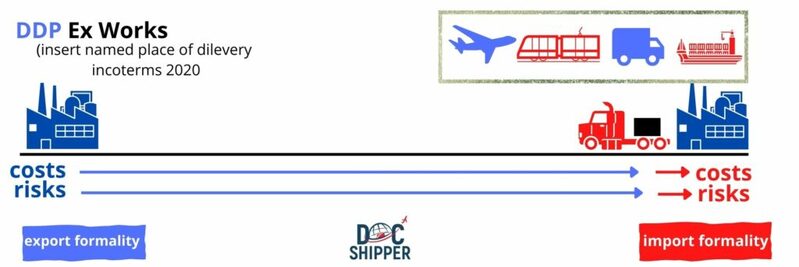
Basic Characteristics of Incoterms Used for Inland Waterway and Sea Transport
Incoterm: FAS (Free Alongside Ship)
The seller provides the products in accordance with the FAS Incoterm when it either docks them alongside the ship or vessel that the buyer has designated at the designated port of shipment, or when it obtains the goods that have been so delivered.
When the items are alongside the ship, the risk of harm to them passes from the seller to the buyer. The vendor agrees to export, not import, clearance for the products.
A carriage agreement is not necessary between the vendor and the buyer. The cost of shipping the goods from the chosen port of export is also the customer’s responsibility. In circumstances when the goods are simply to be delivered to the carrier before being moored alongside the ship, such as at a container terminal, the FAS Incoterm is not relevant. In this case, the FAS Incoterm suggested before is more appropriate.
Additionally, the seller must consent to the things being exported (not import). It is not necessary to complete any insurance.
Incoterm: FOB (Free on Board)
Under the FOB Incoterm, the goods are deemed to be delivered by the seller to the buyer when they are delivered on board the ship nominated by the buyer at the named port of shipment or the seller procures the goods so delivered. Therefore, the risk of loss/damage to the goods is shifted onto the buyer once the goods are placed on board the ship. The seller shall clear the goods for export, not import.
Similar to the FSA Incoterm, the seller is not required to enter into a carriage contract. The customer is responsible for covering all costs associated with transporting the items from the designated port of export.
Under the FOB Incoterm, neither the buyer nor the seller are obligated to finalize any type of insurance.
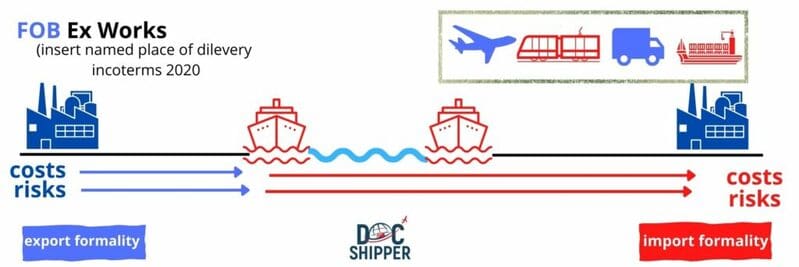
Incoterm: CFR (Cost and Freight)
The CFR Incoterm states that the seller must either deliver the goods to the customer by loading them into the ship or arrange for them to be so delivered. Since the goods are placed on board the vessel at the port of delivery rather than the port of destination as in the case of the aforementioned FOB Incoterm, the risk of loss or damage to the goods is thus transferred to the buyer at this time.
Despite the fact that the risk is transferred at the port of delivery, the seller is still obligated to enter into a contract for the transportation of the goods to the port of destination. Unless otherwise specified in the contract of transport, the seller is also responsible for paying any unloading expenses incurred at the port of destination. It must also clear the products for export, not import. Both the buyer and the seller are exempt from signing an insurance contract.
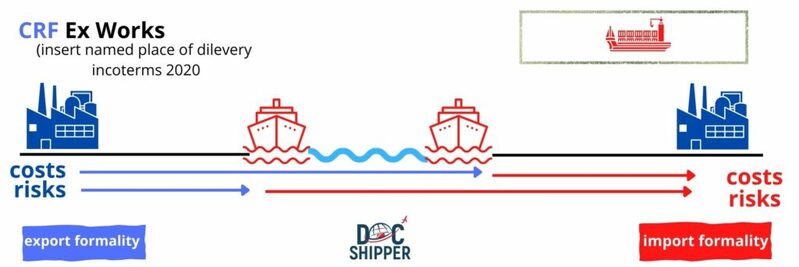
Incoterm: CIF (Cost, Insurance and Freight)
The CIF Incoterm’s regime is fairly similar to the CFR Incoterm’s:
When the seller loads the goods onto the ship or arranges for their delivery in this manner, the commodities are considered delivered under the CIF Incoterm.
Although the risk is transferred at the port of delivery, the seller is still required to enter into a contract for the goods’ transportation until the port of destination.
Unless otherwise specified in the contract of transport, the cost of unloading at the port of destination should be borne by the seller.
It is the seller’s responsibility to export, not import, the items.
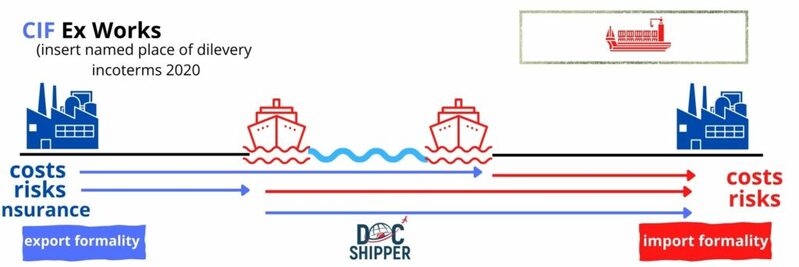
Conclusion
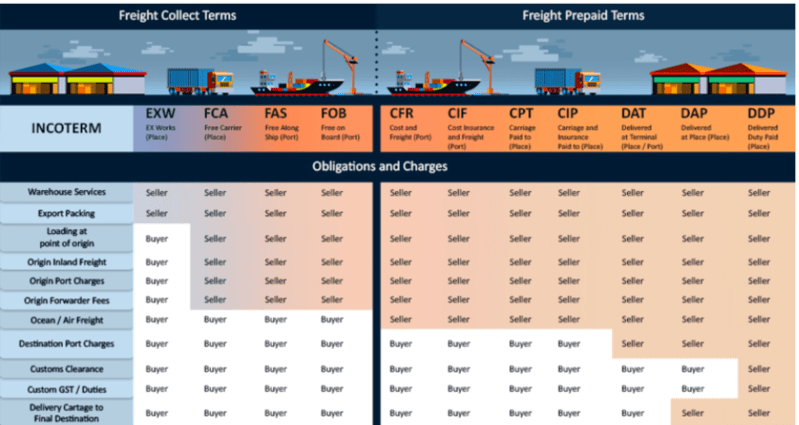
DocShipper Info
DocShipper info: you don’t know which incoterm is the best fit for your needs? We will take care of you. The specialists at DocShipper are always available to help you if you need assistance or guidance. Contact us.
FAQ | The main Incoterms in the international trade field
Read more
Looking for more? Check out these articles.
Looking for more? These articles might interest you:
- Coronavirus (Covid-19) impacts on import/export business
- How does Coronavirus impact international supply chain?
- 💡How to find a good product to sell?
- How to find your reliable supplier for your business? [Fair Trade Guide]
- AliExpress | Use the Chinese panacea to sell your products online
- How a sourcing strategy can rocket your margin?
Need Help with Logistics or Sourcing ?
First, we secure the right products from the right suppliers at the right price by managing the sourcing process from start to finish. Then, we simplify your shipping experience - from pickup to final delivery - ensuring any product, anywhere, is delivered at highly competitive prices.


Fill the Form
Prefer email? Send us your inquiry, and we’ll get back to you as soon as possible.
Contact Us





